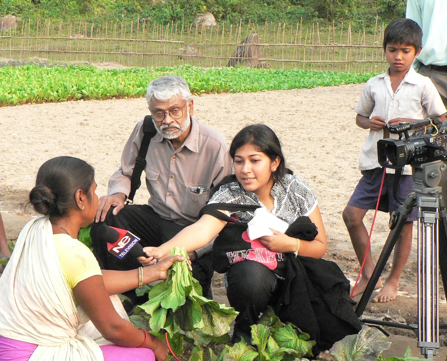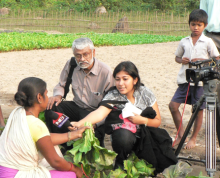
Arul Louis (center) spent one year helping improve environmental coverage in India

Arul Louis (center) spent one year helping improve environmental coverage in India
To try to change that reality, Louis headed to India in early 2008 as an ICFJ Knight International Journalism Fellow to begin work with the Energy and Resources Institute (TERI). A respected think-tank, TERI is headed by Rajendra K. Pachauri, chairman of the Intergovernmental Panel on Climate Change, the international group of top government officials and scientists that shared the 2007 Nobel Peace Prize with Al Gore.
When the International Center for Journalists (ICFJ) sent longtime journalist Arul Louis to boost reporting on climate change in India, he knew he faced a challenge. In the media of India, one of the developing world’s biggest and fastest growing economies, the topic of climate change has rarely bubbled to the surface.
To try to change that reality, Louis headed to India in early 2008 as an ICFJ Knight International Journalism Fellow to begin work with the Energy and Resources Institute (TERI). A respected think-tank, TERI is headed by Rajendra K. Pachauri, chairman of the Intergovernmental Panel on Climate Change, the international group of top government officials and scientists that shared the 2007 Nobel Peace Prize with Al Gore.
Solutions to the problems of climate change “can only come about if the media is active, particularly in democratic societies,” Pachauri declared at a conference organized by Louis, adding, “Unless there is the involvement of the community, you are not going to get anywhere. There has to be a wholehearted momentum at the grassroots level to bring about change.”
Developing that momentum, Louis quickly learned, would fundamentally require greater public understanding of an issue often dismissed as one that has been caused, and should be solved by, the West.
[video: 37823, right, medium]Indeed, on a per capita basis, India trails far behind the United States in greenhouse gas emissions. Yet at recent growth rates, emissions from India and China alone will be enough to drive up global temperatures without any contributions from Europe and the U.S. Moreover, scientists agree that the poor in India and Bangladesh are among those most vulnerable to floods, droughts and other ill effects of rising temperatures.
Despite India’s booming economy, the country – with more than 1 billion people – faces high levels of poverty. In a land where coal-fired power plants are being built as fast as possible, 400 million people still lack electric lights. The impact and implications of the power plant development are still beyond the understanding of those who are in dire need of such assistance – and even of some policymakers who are trying to address that need.
The challenge for India, then, like China and other major developing countries, is to find a path out of poverty that avoids damaging climate and the environment. Along with new technology and massive finance, information is a key component of such strategies.
Luckily, information channels in India abound; the country is home to the world’s largest English-language daily newspapers and thousands of media in English and other languages. It is perhaps the most competitive and fast-growing market for news reporting in the world. In February 2008, Louis initiated his fellowship by convening a meeting between senior editors and top climate-change scientists and negotiators from around the world. In addition to Pachauri, TERI’s director-general, the experts included Yvo de Boer, the head of the United Nations Framework Conference on Climate Change; Jeffrey Sachs, an advisor to the UN Secretary General on climate and development; and Chandrashekhar Dasgupta, a member of the Indian Prime Minister’s Council on Climate Change.
In addition to helping citizens understand how environmental issues directly affect them, reporters need help grasping these issues, said Anil Sinha, who writes about the environment for Dainik Bhaskar, a Hindi-language daily serving 4 million readers. Journalists need readily available, easy-to-understand information and experts who can comment, analyze and explain the issues, especially in Indian languages.
Louis, 58, was among the first experienced journalists that ICFJ sent to a rapidly developing country to boost climate-change reporting. In a year of frenetic activity, he broke a path for other journalism trainers to drag climate-change issues out of the shadows in the developing world. His year of work involved planning, coaching, networking, developing new initiatives and running seminars and training programs.
Born and raised in India, Louis worked there as a journalist before coming to the United States a quarter-century ago to study at Columbia University’s Graduate School of Journalism. Since then, he worked at several U.S. newspapers, most recently as an editor for the New York Daily News. Fluent in Tamil and proficient in Hindi, Louis proved an excellent candidate to serve as a Johnny Appleseed for climate-change reporting in India. ICFJ recruited him to serve as one of its prestigious Knight International Journalism Fellows. The Knight International program prepared him in a week-long orientation program, sent him to the Bali Summit on climate change in December, 2007, and installed him in the New Delhi office of TERI in February, 2008.
Highlights of his year-long fellowship:
- Two “Green-to-Greenbacks” seminars in New Delhi and Mumbai for financial journalists on the financial and business aspects of climate change including carbon trading;
- A seminar for regional media on covering climate in the Northeast region in the shadow of the Himalayas in Guwahati, Assam;
- A seminar in the Tamil language on understanding and covering the impact of climate change on the coastal state of Tamil Nadu;
- Climate-change glossaries in Assamese and Tamil languages that will be available online;
- An online compilation of resource materials for covering climate change and environment available on ICFJ’s e-Learn site;
- A meeting on climate-change coverage targeting editors and scientists on behalf of the British Council of India;
- Helping TERI develop a media strategy that will expand its materials for and its experts’ accessibility to news media covering climate and other issues;
- Development of TERI media resources on health and environment and articles in its magazine, Terragreen;
- Participation in the United Nations Conference on Climate Change in Bali and a speech at the Athens Summit on Climate Change;
- Arranging for TERI director-general R.K. Pachauri, who won the Nobel prize as chairman of the IPCC, to deliver the keynote address at the Annual Conference of the Society of Environmental Journalists in the United States;
- Creation of a professional-development course for editors and reporters at the Indo-Asian News Service (IANS) using climate and environmental issues as topics to enhance journalistic skills and help reporters cover the issues as they affect their beats instead of leaving them to environmental reporters;
- Development of a plan with ICFJ and IANS to open a new, independent journalism institute in New Delhi providing hands-on journalism training with an environmental component;
- Consulting with the Asian College of Journalism in Chennai on various projects to boost environmental coverage; and
- Development with IANS of prototypes for cell phone alerts on air quality and a specialized environmental news package;

Arul Louis (center) spent one year helping improve environmental coverage in India
In democratic India, policies are ultimately determined by voters. People “are not going to vote against electricity plants,” says Louis. “But they can be educated about the choices so that they can demand more environment-friendly energy sources. This is true for other development projects, too.”
Finding relevant stories on climate issues calls for different focuses for different audiences, Louis found. The financial media, for instance, latched onto the promise of new technologies and business opportunities. Lok Sabha TV, analogous to C-Span in the United States, produced a 53-minute program that included a documentary, a panel discussion and a call-in segment on carbon trading – all in Hindi. In Guwahati, in Eastern India, the focus was on the melting of glaciers and the resulting depletion of runoff. Other parts of India worry about drought or the flooding of rivers and low-lying coastal lands.
Louis found regional media to be the most hungry for information about climate change, its effects and the need to adapt.
Dileep Chandan, editor of the weekly Asom Bani in Guwahati, said, “Training programs … will help journalists here cover the environmental and climate-change problems and help the people understand them.” He added most reporters don’t have the time or opportunity to learn about climate change. “Many journalists are interested in covering climate change and basic training will help them.”
Louis’ efforts to put climate-change on the radar of India’s media are a good beginning – but just a beginning. “I can see areas where we have made progress,” he says, “and to be honest, many others where we have to do much more.”
His fellowship is a prototype for projects ICFJ envisions in China, Brazil, Indonesia, and beyond. These countries are pivotal to the success of a global effort to limit the scale and impact of climate change. Since success requires swift action, there is no time to waste.